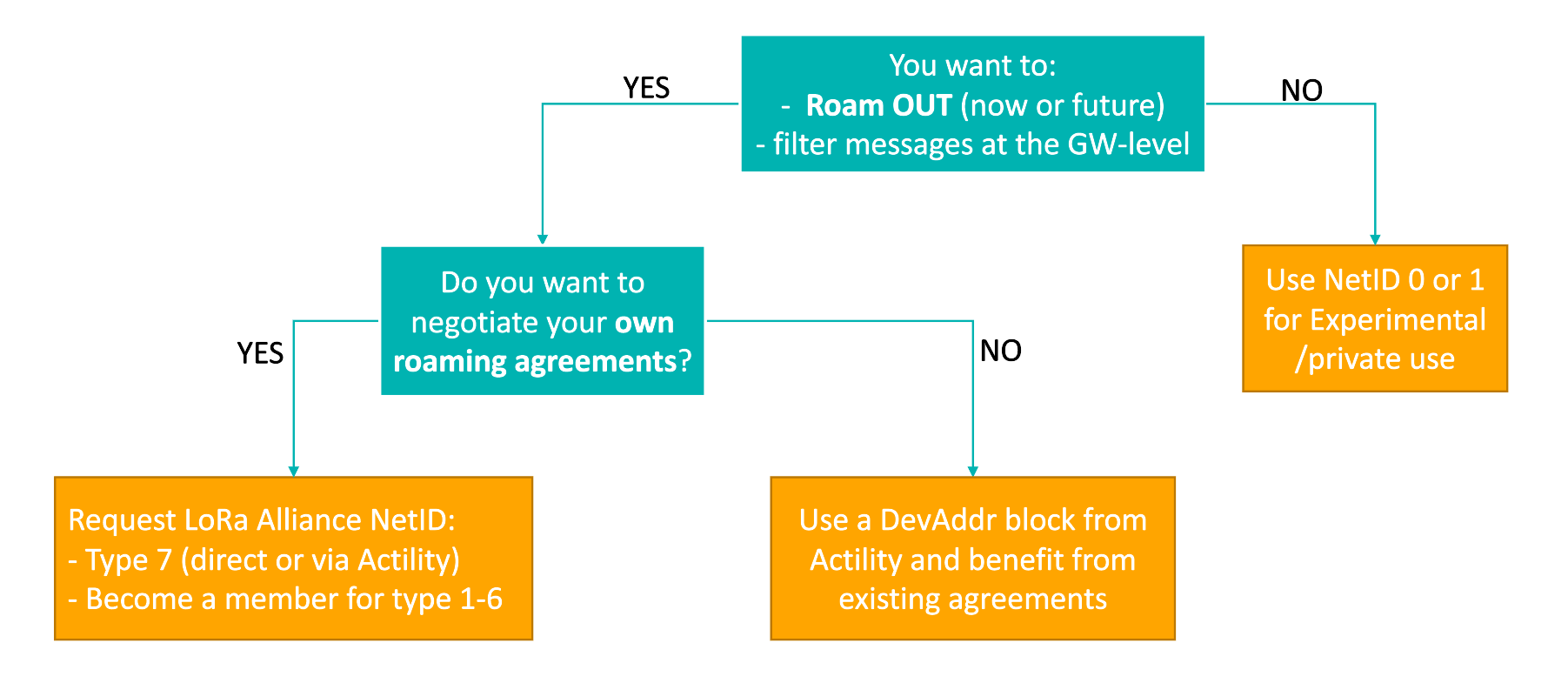LoRaWAN NetID
What is a NetID?
NetID is a 24bit network identifier assigned to LoRaWAN networks by the LoRa Alliance.
Values 0x000000 and 0x000001 are reserved for experimental networks and networks that
do not use the roaming-out feature. These values can be used by any network without getting
permission from the LoRa Alliance.
LoRaWAN networks that use roaming-out need to obtain a unique NetID value.
Roaming-out means that your LoRaWAN devices may roam outside the coverage area of your local network while being served through foreign gateways belonging to your roaming partners.
Roaming-in means that foreign devices belonging to your roaming partners may be served by your local gateways.
Each device must be associated with one NetID:
- The NetID dictates the prefix of the device address, through the NwkID field of the DevAddr.
- For OTAA devices, the NetID is sent to the device over the air, in the Join Accept message.
NetID types & sizes

| NetID Type | NetID range (hexadecimal) | Number of distinct DevAddr per NetID |
|---|---|---|
| 0 | 0x000000 - 0x00003F | 33,554,432 |
| 1 | 0x200000 - 0x20003F | 16,777,216 |
| 2 | 0x400000 - 0x4001FF | 1,048,576 |
| 3 | 0x600000 - 0x7FFFFF | 131,072 |
| 4 | 0x800000 - 0x9FFFFF | 32,768 |
| 5 | 0xA00000 - 0xBFFFFF | 8,192 |
| 6 | 0xC00000 - 0xDFFFFF | 1,024 |
| 7 | 0xE00000 - 0xFFFFFF | 128 |
Do you need a dedicated NetID?
Dedicated NetIDs are required any time you need to distinguish your network from others, such as when you are entering a peering/roaming agreement with another network.
Having your own NetID also allows you to identify your LoRaWAN packets with a specific prefix pattern on the air interface, allowing base stations to filter packets originated from your own devices from those registered to other LoRaWAN networks, which significantly reduces backhaul traffic and associated charges when you use bandwidth-constraint backhaul such as cellular or satellite links.
If you do not have your own NetID, your network will have to operate using NetID 0x000000 or 0x000001.
These NetIDs are for experimental use and, similar to private IP addresses (10.x.x.x), will not allow
any inter-networking with other LoRaWAN networks for roaming-out use case.
You will still be able to accept roaming-in devices and route traffic to their home network.
This flow chart may help you find the best option for your deployment:

Acquiring a dedicated NetID
Members of the LoRa Alliance receive NetIDs based on their membership level, and can license an unlimited number of Type 7 NetIDs for a fee.
- Sponsor: assigned one type-0 NetID + another type-3 NetID
- Contributor: assigned one type-3 NetID + another type-6 NetID
- Adopter/institutional: assigned one type-6 NetID
- Members: may get an ‘unlimited’ number of type-7 NetID blocks (a block consist of 16 or 32 contiguous NetIDs).
- Non-members: may also purchase a limited number of type-7 NetID blocks (typically one or two blocks) either through Actility or directly from the LoRa Alliance.
ThingPark’s patent to expand the available address space
The smaller NetID types, such as type-7, have a very limited addressing space on the air interface. It is impossible to connect more devices without creating addressing collisions where multiple devices will need to share a same DevAddr.
Without specific technology, this limited addressing space severely limits the usefulness of shorter NetIDs, and forces the use of more expensive, larger NetIDs. However, ThingPark users benefit from Actility’s internationally-patented ambiguous decoding technology, hence they can connect up to 200x more devices on any given NetID size (it is however recommended to not exceed 50x).
This technology also works for your devices as they roam-out to other networks, as long as the home network is using the ThingPark platform.
NetID on ThingPark Enterprise
ThingPark Enterprise allows configuring NetID on TPE instance level:
-
If you are using a self-hosted instance deployed as an appliance/VM, this configuration is done in Cockpit, as described in Configuring NetID.
-
For SaaS instances, by default your network uses the NetID
0x000000, which does not allow you to activate roaming-out services. If you own a NetID, contact the ThingPark support team who will configure it on your ThingPark enterprise subscription(s).
Actility's NetID 0x000002 | Own NetID | NetID 0x000000or 0x000001 | |
|---|---|---|---|
| Roaming-In | Enabled by default | Depends on customer strategy | Depends on customer strategy |
| Roaming-Out | According to Actility's wholesale agreements | Depends on customer strategy | Not possible |